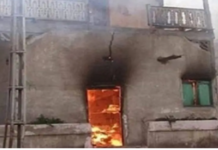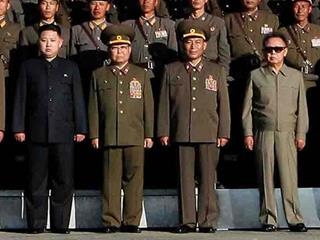
By Michael Ireland, Chief Correspondent for the ASSIST News Service (www.assistnews.net)
MONTEREY, CA (ANS – February 3, 2018) — North Korea has worked for more than a decade to build nuclear weapons and missiles.
And, although Kim Jong Un, the isolated nation’s leader, has been called “mad” and a “rocket man,” a US expert on nuclear policy doesn’t think he’s crazy, according to Dave Mosher writing for Business Insider at http://www.businessinsider.com
Mosher says Kim most likely wants nuclear weapons to deter a US invasion because he doesn’t trust the country.
He writes that obtaining nuclear weapons could give North Korea a better chance at diplomacy, similar to China during the Cold War. But Kim could also take his country in the opposite direction.
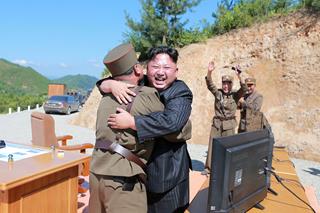 North Korean leader Kim Jong Un has been called many things — crazy, mad, insane, and “rocket man” — because of his program to build nuclear bombs and missiles capable of launching the weapons to the US.
North Korean leader Kim Jong Un has been called many things — crazy, mad, insane, and “rocket man” — because of his program to build nuclear bombs and missiles capable of launching the weapons to the US.
But Mosher writes that experts say he is not crazy to want a nuclear arsenal. And Kim doesn’t necessarily want nukes because of a desire to use them on the US or any other country, contrary to what bellicose political rhetoric might suggest.
“He is not crazy — he has consolidated control over that country in a very effective and ruthless manner,” Jeffrey Lewis, a nuclear-policy expert at the Middlebury Institute of International Studies at Monterey in California, told Business Insider. “He’s just willing to do really terrible things to protect himself, which I think tells us something about the credibility of their nuclear threat.”
Such a threat is the purpose of the weapons, Lewis says, but almost certainly not their goal.
“If I were Kim Jong Un, I would want nuclear weapons, too,” added Lewis, who also publishes Arms Control Wonk, a site about nuclear arms control, disarmament, and nonproliferation (www.armscontrolwonk.com ).
Here are the most likely reasons Kim wants a nuclear arsenal.
The US has a track record of breaking its word with rulers
Mosher writes that a watershed moment for US-North Korea relations occurred during the Bush administration in the mid-2000s: the six-party talks, initiated after questionable accusations that North Korea was cheating on an agreement not to pursue the production of nuclear materials led to its collapse.
“They very sincerely tried to put Humpty Dumpty back together again,” Lewis said.
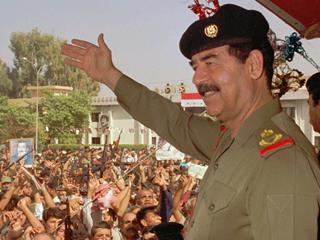 But one of the problems the Bush administration ran into was the US’s track record with Iraq, formerly led by Saddam Hussein.
But one of the problems the Bush administration ran into was the US’s track record with Iraq, formerly led by Saddam Hussein.
“How do you assure the North Koreans, when they sign a deal, that they don’t end up like Saddam? Because Saddam had actually given them the WMDs, and we still went ahead and said he had them, and we still went ahead and invaded,” Lewis said, using the abbreviation for weapons of mass destruction.
The Americans “realized they had to find a way to convey to Pyongyang that if they went ahead and gave up their nuclear program, we wouldn’t invade them,” Lewis added.
So, Lewis said, the Bush administration pointed to how the US had held up its end of a disarmament agreement with Libya and its ruler at the time, Muammar Gaddafi.
“I know why they did it at the time — it was the right decision,” Lewis said. “But we had a disarmament deal with that guy. We told the North Koreans to go look at how well things had worked out with Libya, and then we turned around and toppled the Libyan government.”
Mosher writes these foreign policy decisions happened during the rule of Kim Jong Il, the father of Kim Jong Un. But his son has not forgotten them.
“Kim Jong Un, I think, is fearful of ending up like Saddam Hussein or Muammar Gaddafi,” Lewis said. “He is terrified that we will do to him what we did to them and has decided that nuclear weapons are the best way to ward that off.”
It’s unlikely North Korea has nuclear and thermonuclear weapons as reliable as those in the US’s arsenal, if North Korea has deliverable weapons at all. But Lewis says this doesn’t really matter in the big picture.
“Every military system has developmental problems and issues, and maybe not work as well as it should,” Lewis said. “But they have all of the skills and expertise in place, and they’ve demonstrated the vast majority of things.”
He added: “If tomorrow they were going to put a nuclear weapon on a missile and fire it at my house, and you asked me, ‘How do you like your odds?’ I would say, ‘I don’t like my odds at all.’ This is now a serious-enough capability that we have to start assuming, on a bad day, a lot of their stuff is going to go well.”
But nuclear weapons as a stick against the US is not the only reason North Korea wants them, Mosher writes.
A risky play for better diplomacy?
Some reports suggest Kim wants to use nuclear weapons to strong-arm South Korea into reunifying with North Korea. Lewis doubts this is true, though he says Kim is “insatiable” for power.
“I am sure if given the choice between controlling North Korea or North Korea and South Korea, he would clearly prefer to control everything,” Lewis said. “I don’t think, though, that this explains their nuclear behavior.”
That may be because Kim’s ability to take over South Korea — at least not as a smoldering crater — is virtually nil. Lewis also says North Korea isn’t building the kinds of nukes “that would be consistent with that goal.”
What is possible, if not likely — and perhaps surprising to many Americans — is that North Korea sees obtaining nuclear weapons as a way to improve its relations with other countries, including the US.
Lewis, who has studied the history of China’s nuclear-weapons program, says it has many similarities to North Korea’s path toward nuclearization.
 China set off its first nuclear device in 1964 during the presidency of Lyndon B. Johnson, and two years later it launched a live nuclear warhead atop a missile to prove the capabilities of its program. The US’s view of these events during the Cold War was grim. But over time, something shocking transpired.
China set off its first nuclear device in 1964 during the presidency of Lyndon B. Johnson, and two years later it launched a live nuclear warhead atop a missile to prove the capabilities of its program. The US’s view of these events during the Cold War was grim. But over time, something shocking transpired.
“If you had gone into Lyndon Johnson’s office in October 1964 and said, ‘The Chinese are about to test a nuclear weapon,’ he would have said, ‘That’s terrible,'” Lewis said.
“But if you would have then said, ‘No, no, no, it’s great — this is really going to improve Chinese security, and as a consequence of that, China is going to reorient its foreign policy, and they’re going to become anti-Soviet and pro-American, and we’re going to have a diplomatic relationship with them,’ Johnson would have asked you: ‘Really? What president is going to go to China and meet with Mao Zedong?’ And you would have said, ‘Richard Nixon.’ Then he would have thrown you out of its office and said you were an idiot.”
But that is exactly what happened: When China’s proven nuclear capabilities deterred US military action and opened the door for increased local aggression or international diplomacy, China chose the latter.
“The reason it happened is because the people who wanted nuclear weapons in China also wanted a better relationship with the United States,” Lewis said.
His point is that North Korea’s motivations, notwithstanding its accusations of horrifying human-rights abuses, may not be so nefarious as rhetoric and propaganda suggest when it comes to nukes. In fact, it could be that North Korean nuclear scientists see themselves more as doves than hawks.
But the country’s direction is ultimately up to its leader.
“It is possible that the North Koreans will take the security they are given by these weapons and spend it on being awful — sinking more South Korean ships, shelling more South Korean islands, initiating more crises,” Lewis said. “It will depend on how the North Koreans choose to act now that they have this capability. They could be easier to get along with; they could be worse.”
Instead of always assuming the worst, we should practice being “more neutral” about how having nuclear weapons might change North Korea, Lewis said.
“I don’t want to be optimistic, because it could really, truly go either way — North Korea could become more aggressive; North Korea could become less aggressive,” Lewis said. “But we should wait and see.”
He added: “You don’t want to prejudge something like that and foreclose what could be a chance at peace.”
Mosher concludes this likely isn’t the US’s current thinking. President Donald Trump has expressed hopes to expand nuclear-weapons capabilities, and American military forces appear to be quietly training to face a conflict on the Korean Peninsula.
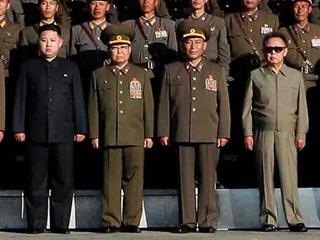 Meanwhile, YahooNews reports North Korea recently sent a rare announcement addressed to “all Koreans at home and abroad,” saying they should make a “breakthrough” for unification without the help of other countries, its state media said.
Meanwhile, YahooNews reports North Korea recently sent a rare announcement addressed to “all Koreans at home and abroad,” saying they should make a “breakthrough” for unification without the help of other countries, its state media said.
It said all Koreans should “promote contact, travel, cooperation between North and South Korea” while adding Pyongyang will “smash” all challenges against reunification of the Korean peninsula.
The announcement, issued after a joint meeting of government and political parties, added Koreans should wage an energetic drive to defuse the acute military tension and create a peaceful climate on the Korean peninsula.
Military tension on the Korean peninsula was a “fundamental obstacle” for the improvement of inter-Korean relations and unification, the North’s official news agency said.
It added joint military drills with “outside forces” has shown to be unhelpful for the development of relations between North and South Korea.
North Korea did not provide details why the meeting had been held but the statement said it was aimed to support leader Kim Jong Un’s remarks regarding unification from his New Year’s address. It said this year is meaningful for both North and South Korea as it is the 70th anniversary of the founding of North Korea while South Korea will be hosting the Winter Olympics next month.
Photo captions: 1) North Korean leader Kim Jong Un with a military scientist after testing an intercontinental ballistic missile. (KCNA via Reuters). 2) Iraq Saddam Hussein Baghdad Iraqi President Saddam Hussein in 1995. (AP Photo/INA). 3) Kim Jong Un, far left, and his father, Kim Jong Il, far right. (AP Images) 4) Mao Tse-Tung, the Chinese Communist Party leader, and US President Richard Nixon meet in Beijing in 1972, marking the first time an American president visited China. (Associated Press). 5) Michael Ireland of ASSIST News Service.
 About the Writer: Michael Ireland is a volunteer internet journalist serving as Chief Correspondent for the ASSIST News Service, as well as an Ordained Minister, and an award-winning local cable-TV program host/producer who has served with ASSIST Ministries and written for ANS since its beginning in 1989. He has reported for ANS from Jamaica, Mexico, Nicaragua, Israel, Jordan, China, and Russia. You may follow Michael on Facebook at https://www.facebook.com/MichaelIrelandMediaMissionary, and on Twitter at @Michael_ASSIST. Please consider helping Michael cover his expenses in bringing news of the Persecuted Church, by logging-on to: https://actintl.givingfuel.com/ireland-michael
About the Writer: Michael Ireland is a volunteer internet journalist serving as Chief Correspondent for the ASSIST News Service, as well as an Ordained Minister, and an award-winning local cable-TV program host/producer who has served with ASSIST Ministries and written for ANS since its beginning in 1989. He has reported for ANS from Jamaica, Mexico, Nicaragua, Israel, Jordan, China, and Russia. You may follow Michael on Facebook at https://www.facebook.com/MichaelIrelandMediaMissionary, and on Twitter at @Michael_ASSIST. Please consider helping Michael cover his expenses in bringing news of the Persecuted Church, by logging-on to: https://actintl.givingfuel.com/ireland-michael
** ASSIST News Service (www.assistnews.net ), founded some 25 years ago by author, broadcaster and journalist Dan Wooding, exists to “give a voice to the voiceless” – our brothers and sisters in Christ who do not have a voice to tell the world of their suffering for Naming the Name of Christ at Work, at Home, or in the Marketplace. Would you consider a one-time or more frequent gift to help sponsor our unique News Service dedicated to providing news and feature stories about the Persecuted Church Around the World? Please help as you can, by going to www.assistnews.net, and then scroll down to where it says DONATE TO ASSIST NEWS and then put in the figure you would like to donate towards our service. If you prefer a check, just make it out to ASSIST and mail it to PO Box 609, Lake Forest, CA 92609, USA, with a note in the memo section saying: ‘Where Needed Most.’ Thank you so much on behalf of the Persecuted Church.
*** You may republish this, or any of or ANS stories, with attribution to the ASSIST News Service (www.assistnews.net). Please also tell your friends and colleagues that they can get a complimentary subscription to ANS by going to the website and signing up there.




